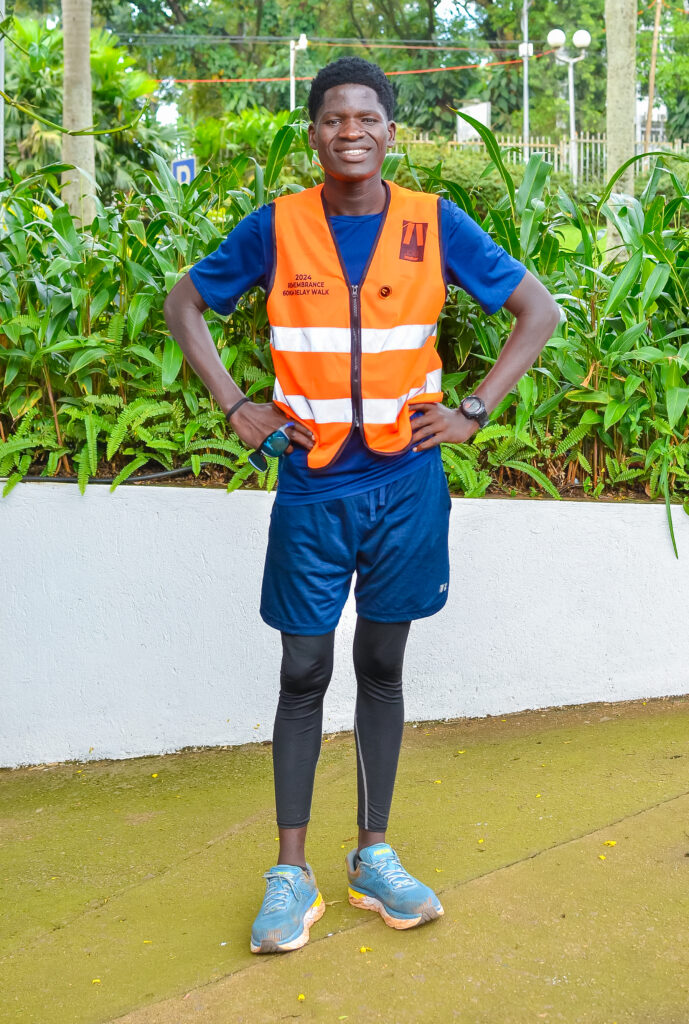
How Ssembogo became the fastest walker in the Remembrance Walk a second time
BY GLORIA IRANKUNDA
John Ssembogo, was crowned the fastest walker in the November 17 Joe Walker Remembrance Walk, completing 60 kilometres in 8 hours, 22 minutes, and 58 seconds. This marks his second win. He shares the strategies and passion behind his achievement.
As the fastest walker, what techniques or strategies did you use to maintain your pace over such a long distance?
I’ve mastered pacing, knowing when to push harder or ease up. I adjust my stride and effort based on the terrain-uphill, downhill, or flat, to maintain a steady pace. Early on, I matched the pace of a group but broke away when it slowed. Though some participants alternated in teams, I reminded myself I was in it alone. After catching up with the leading walker near Namboole, I took the opportunity to surge ahead and claim the lead.
What personal goals or milestones did you set for yourself before participating in the Joe Walker Remembrance walk, and did you achieve them?
This year, I focused more on running than walking, as walking events are less frequent. I participated in several marathons, including the Kigali International Peace Marathon on July 27th, the Kilimanjaro Marathon, the Nairobi Standard Chartered Marathon, and the Mount Rwenzori Marathon in Kasese, each covering 42 km. My goal was to maintain a strong running routine, and I successfully achieved that through these events.
Did you face any unexpected challenges during the walk, and how did you overcome them to stay ahead?
I had anticipated rain, but instead, the sun was intense. Luckily, I had packed my sunglasses, which helped me manage the glare and heat that challenge many walkers. As a long-distance walker, I’m accustomed to various conditions, and having the right gear made it easier to stay focused and push through.

John Ssembogo after finishing first in the 60km walk
How do you stay motivated to keep walking when fatigue sets in, especially during the later stages of the walk?
I didn’t experience significant fatigue or pain during the walk. I completed it feeling strong, and by the time I reached the Sheraton hotel, I was just a bit tired, as expected after a long distance. Staying hydrated and maintaining a strong mindset are key for me. From the start, I commit to reaching the finish line no matter what. When fatigue sets in, I create positive energy by singing songs in my head, which keeps me motivated and focused until I cross that finish line.
What was the atmosphere like for you as you crossed the finish line, and how did you feel about your performance?
The atmosphere was uplifting as I reached the final point at Sheraton Hotel. Ladies cheered me on, and among them was Christelle, known as ‘Mother Hen.’ Seeing her there gave me a surge of strength, and I thought, “I could go for another 40km!” When I crossed the finish line, I felt an overwhelming sense of happiness.
In your experience, what is the most rewarding part of completing a long-distance walk like this one?
Completing a long-distance walk like this is rewarding on multiple levels. First, as part of a team promoting road safety, I wanted to send a message to road users, hoping it would make a difference. Second, it was a personal journey for me, as I walked to honour and remember my loved ones. Third, sharing the experience with my community added another layer of meaning. The competitive aspect drove me to finish first, which I did. The reward of a Shs300,000 shopping voucher from Capital Shoppers was a nice bonus, making the experience even more fulfilling.
How do you push through the physical and mental barriers during such an intense event?
The loss of my two brothers in road accidents weighs heavily on me, but each time I participate in the Joe Walker Remembrance Walk, it becomes more than just a physical challenge—it’s a spiritual connection to them. In the beginning, I faced mental struggles, but I reminded myself that I was ready. As the walk continued, those challenges faded, and by the end, I felt a deep sense of peace, with no physical barriers holding me back.
How do you feel about being the fastest walker, twice?
Being the fastest walker twice feels great. Seeing myself in the newspaper made me feel proud and humbled, especially knowing my mom was thrilled. I’m excited for my children to read about their dad standing for something meaningful. I kept a copy of the paper as a reminder of this major achievement. This year has been a huge milestone, and I’m extremely happy.
After completing the 60 km, what kind of recovery process do you go through to ensure your body bounces back quickly?
I start by drinking a cup of milk and having a meal with fish and greens. The next day, I take an ice bath to aid muscle recovery. I then follow up with a massage and take two full rest days, avoiding any running or walking. On the third day, I do an easy walk or a light run, around 5 to 10 km. I maintain this routine for about a week until my body feels fully recovered.
What role does community and the sense of joy and fun play for you during such events, even when focusing on personal achievement?
The Joe Walker community means a lot to me. Each time I participate, I reconnect with people, and that sense of joy and fun enhances the experience. Meeting old friends and walking together fuelled my determination to defend my championship. If I had walked alone, it wouldn’t have had the same impact. Their presence added depth to the journey, making it more meaningful.
Do you have any advice for someone looking to improve their endurance for long-distance walking?
To improve endurance for long-distance walking, regular exercise is essential. You can’t just wake up and walk 60 km without preparation—you need to train. While walking the full distance every week isn’t necessary, consistent practice is important. Start with 10km a day and aim for 25 to 30km weekly. Include endurance exercises like swimming, cycling, or using stationary bikes to boost stamina. The key is staying active and consistently training, rather than waiting until the day of the competition.
What does the cause of road safety mean to you?
Road safety is deeply personal to me, especially after losing my two brothers in tragic road accidents—one in 2013 and the other in 2021. Their deaths have left me with the responsibility of caring for their four children, and it has shaped my drive to advocate for road safety. These losses have motivated me to work tirelessly for my family, and I carry their memory with me in everything I do. I miss my brothers greatly; they were not only family but also my close friends, and I often wish I could still talk to them.
Having completed such a physically demanding event, how does it affect your perspective on endurance and resilience in other areas of life?
Completing this event reinforced the reality that in life, we often face challenges alone. It’s up to us to keep moving forward and stay focused on our goals. Success requires hard work and persistence—just like mining gold. Keep going, no matter the obstacles, and celebrate when you reach the finish line.





